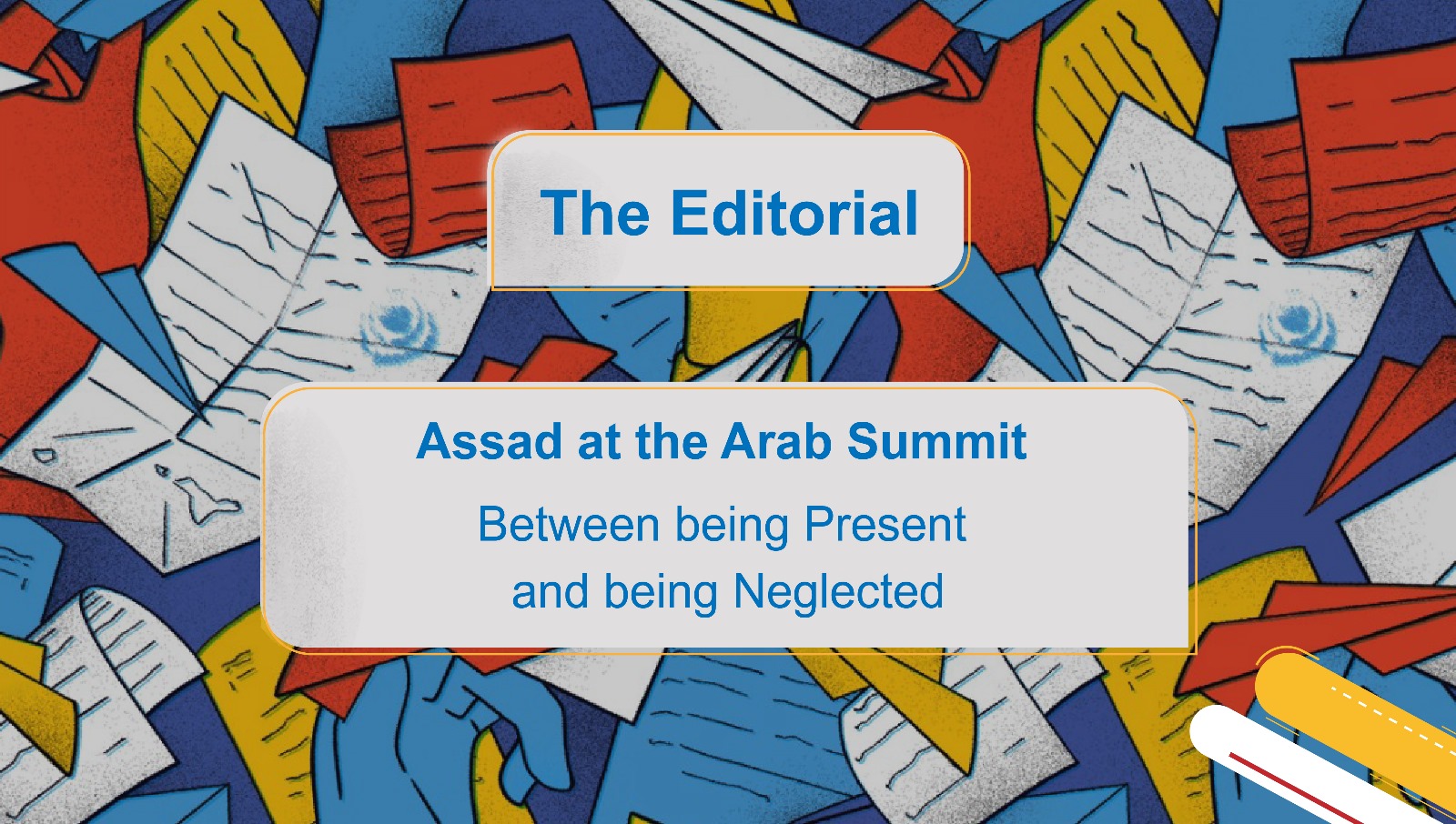Assad at the Arab Summit: Between being Present and being Neglected
- updated: May 23, 2024
- |
On May 16, 2024, the Arab Summit was held in Manama, the capital of Bahrain, with the participation of Syrian regime President Bashar al-Assad. This marked his second attendance after last year’s Jeddah Summit, where Syria’s seat was reinstated in the Arab League in 2023.
The return of Assad to the Arab Summit and the normalization of relations with him were hoped to lead to the implementation of decisions made at the Amman meeting, aiming to prevent drug trafficking, create suitable conditions for the voluntary and safe return of refugees, and advance the political solution according to Resolution 2254, while distancing from Iran.
However, Assad did not fulfil his commitments made during his visit to the UAE prior to his invitation to the Jeddah Summit, which proposed a step-by-step initiative launched by the Jordanian King from Washington in July 2021. This initiative resulted in Syria’s return to the Arab League and the formation of an Arab communication committee to monitor the implementation of the Amman meeting in May 2023 regarding the Syrian crisis. However, the regime did not make any progress. It became evident that it could not control drug manufacturing and smuggling, as the responsibility for drugs lies with the Fourth Division led by his brother Maher al-Assad.
Moreover, no steps were taken towards a political solution, releasing detainees, revealing the fate of the missing persons, or providing suitable conditions for the return of refugees. Consequently, Arab interest in the Syrian file declined, leading to a lack of economic assistance that the regime hoped to obtain due to the state’s bankruptcy and limited resources. Information leaked that Iranian President Ebrahim Raisi’s visit to Damascus aimed to collect Iran’s debts estimated at fifty billion dollars and acquire some state assets.
Arab countries are unable to violate the Caesar Act and the US sanctions imposed on Syria. As a result, the Arab-Syrian track froze, and the meeting of the Arab communication committee in Baghdad, scheduled for May 7, was postponed.
Assad did not speak at the summit, perhaps because he had nothing to say or offer. He even did not respond to King Abdullah II of Jordan, who demanded in his speech at the Arab Summit the implementation of a policy of good neighborliness, border control, and ending drug and Captagon trafficking, which Jordan confronts firmly to protect its youth from external threats.
This could be interpreted as a sign of political arrangements in the region and an indication that the next phase will witness transformations and changes.
It was noted that Syrian regime President Bashar al-Assad was not among the heads of state walking on the red carpet in the honor corridor. His absence from it was interpreted as neglect because he did not adhere to the conditions for his return to the Arab League.
His attendance at the summit, without objecting to the final statement, which emphasized the necessity of ending the Syrian crisis in line with UN Security Council Resolution 2254, preserving Syria’s security, sovereignty, and territorial integrity, and meeting the interests and aspirations of its people, reaffirmed the importance of the Arab communication committee and the Arab initiative to solve the crisis, with the support of the UN efforts in this context.
The regime made changes in its security and political structure after the Baath Party conference, aiming to send messages abroad about its readiness for some kind of settlement, although the discourse suggests otherwise.
The calmness on the Syrian front with Israel after the Gaza war, and the regime’s isolation from the rest of the resistance axis in avoiding military involvement in the Gaza war, is presented as distinguishing itself from its allies in the resistance axis.
The regime is exhausted and destroyed, and the time game it relied on is currently working against it because Syrians in its areas live in dire conditions that are difficult to endure. The areas outside the regime’s control are not better, and the protests in Idlib and its countryside demanding the isolation of [Hayat] Tahrir al-Sham leader Abu Mohammed al-Jolani, the release of detainees held by him, and revealing the fate of the missing persons have put the region in a state of alert and agitation, threatening security with signs of repression of these protests and demands.
The Syrian Women’s Political Movement welcomes the positive stance of Arab countries towards the legitimate demands of the Syrian people, clearly reflected in the final statement. However, it simultaneously asserts that Assad’s continuation poses a stumbling block to achieving security and stability in the entire region.
The Syrian Women’s Political Movement believes that there is no benefit in re-floating Assad. His return to Syria’s seat at the Arab Summit and the normalization of relations with him, hoping he would implement the Arab initiative’s decisions and UN Security Council Resolution 2254, will not be beneficial. Indicators show that the decision is no longer in his hands.
The Syrian Women’s Political Movement calls on the Arab League to seriously deal with the Syrian situation, as the regime’s persistence under Bashar al-Assad’s leadership means that the region remains under the threat of wars and instability. Syrians, both men and women, continue to demand political change and transition to a democratic state, a state of law, justice, and equality for all its citizens.
Political Committee of the Syrian Women’s Political Movement
